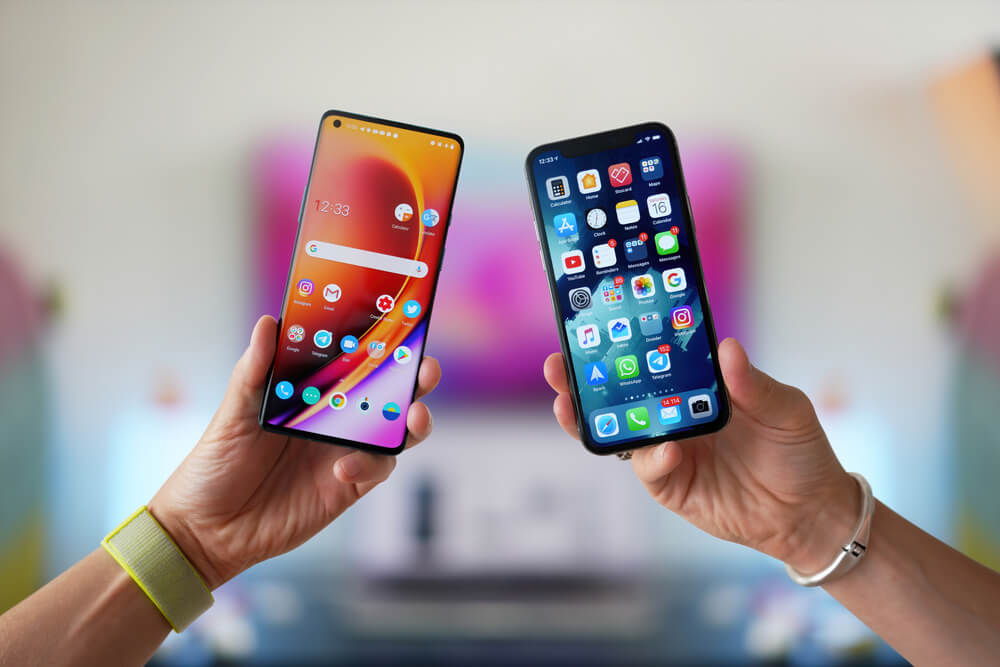There are big differences between iOS and Android mobile platforms, especially in how they attempt to mitigate cybersecurity threats. For years, iOS has enjoyed the reputation as the most secure mobile operating system; however, recent changes are allowing Android to make some headway and close the gap between the two.
You can never be completely secure on a mobile device, or any device for that matter, and regardless of which platform you use, you can still be vulnerable to threats. However, is there a more secure option? Should security-conscious phone users be using one over the other?
The Threats To Your Mobile Security
Before we begin to compare the two operating systems, it is important that we understand the threats present to mobile phone users. As the use of mobile phones continues to rise exponentially, the array of threats presented to users is also increasing.
The following are some of the most common threats to mobile phone users:
- Malware attacks
- Phishing or social engineering attacks
- Data breaches
- Security weaknesses in software or hardware
Updates
Similar to your computer, the easiest way to keep your mobile device secured is to regularly and consistently update your OS. Simply keeping your software up to date can stop entire waves of malware. When it comes to updates, Apple and iOS is the clear winner. Apple maintains an unprecedented control over the iPhone and iOS experience, resulting in most users receiving and being prompted to install software updates and security fixes quickly. This is a big difference compared to Android.
Google, on the other hand, has a big problem with delayed OS updates. manufacturers and carrier networks simply release their own customised OS updates on their own schedule, which often leaves users either updating their Android phones rarely or not at all. With more mobile malware appearing in the Google Play Store, this can leave Android phones vulnerable.
Fortunately for security-conscious Android users, in 2019 Google announced that Android security updates were finally going to be automated. This process will be happening in the background, similar to how Google already updates its apps, and will no longer require users to reboot their phones. While this doesn’t solve Google’s OS update issue, the move to push security updates is a step in the right direction.
Permission Control
Next to vulnerabilities in your OS, the biggest threat to your mobile device’s security comes from apps that gather your personal data and then leak it, either intentionally or accidentally. Apps that demand excessive permissions to access your data are obvious threats to your mobile security.
iOS 13 boasts a mandatory privacy tool, called Sign In, that helps prevent apps from accessing any of your data. The security feature uses your Apple ID, not your email address, to verify your details when logging into any of your apps. In addition, iPhone users will no longer have to worry about creating fake email addresses when trying new services as Sign In will create and provide a throwaway email address for you to use.
However, Android 10 also boasts a new, dedicated Privacy section in its Settings that allows users to monitor and block any permission requests from any of the apps they use. Before, managing app permissions on Android was frustratingly difficult. But now, a one-click reject button for each app in an easy to use list is much more convenient for users, giving them greater control in Google’s open-source playground.
While having control over your app’s permissions is an improvement for both iOS and Android users, malware apps that don’t have permissions are still able to piggyback on your other apps to gain access to users data. This raises the question; what use are permission controls if malware apps are still making it onto the App Store or the Google Play Store?
App Stores
Apple’s tight control over the App Store has largely prevented iPhone users from falling victim to the malware that affects Android users in disproportionate amounts. Apple’s “whatever it takes” approach to security has led to some apps being rejected from the App Store for arbitrary reasons. However, this has been argued to be worth it to keep the App Store mostly malware-free.
Android, on the other hand, has proven itself to be traditionally more vulnerable to malicious apps. Google has long taken the “secure enough” approach to its security. While it didn’t catch every single malicious app that was uploaded to Google Play, only a small percentage of users were likely to ever encounter anything malicious. However, thanks to Android’s huge global popularity even 1% of users affected by malware could be the equivalent of millions of users.
Geotracking
Security-conscious users of both operating systems stand to benefit from new location-blocking options available on both platforms. Android has made strides to join Apple in providing you with a more granular approach to geolocation control. Previous versions of Android only allowed users to say yes or no to app’s location requests. Now users will have three options; Accept, Deny or let your app access your location information while you are using the app.
iOS provides iPhone users with the option of sharing their photos without having to share their location data. This means each picture will no longer leave a data trail across messages, emails or social media. The process is simple and can be accessed from the Photos app. Android also allows users to remove location data from photos from their Android phone’s Photos app.
What Both Can Do Better
When it comes to picking one OS over another, it is important to remember that there is a big difference between how Apple and Google approach mobile security. Both companies have different goals and business models and address any potential security concerns with that in mind. Apple has a strict “whatever it takes” approach while Google approaches its mobile security with a “good enough” style.
The truth is both Google and Apple are succeeding at mobile security, especially if you measure it through the lens of their respective business models. Google has to maintain a massive alliance of hardware and software developers to ensure they can continue to provide the most popular OS on the planet. Their security limitations are required to keep that uneasy alliance going.
Apple, on the other hand, knows that their reputation is everything so they go the extra mile to ensure users feel safe on iPhones. Not only does this mean they can charge more for their products, but it also makes users feel comfortable spending money with their iPhones.
Rather than choosing a straight winner, it is important that users continue to hold both Apple and Google accountable for their mistakes and shortcomings. Mobile security is a big issue with users storing a lot of personal information on their device, so it is vital both of these tech giants continue to innovate and improve their mobile security.



















“We were very impressed with the service, I will say, the vulnerability found was one our previous organisation had not picked up, which does make you wonder if anything else was missed.”
Aim Ltd Chief Technology Officer (CTO)